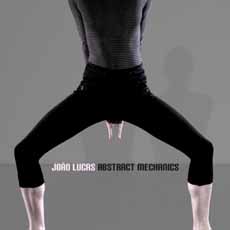
abstract mechanics
João Lucas
Miguel Mira
Thiago Lucas
cs165
The choreography “It was a very abstract thing” arose from the will to challenge the strange world of abstraction – whatever that may be, or whatever it is we may want to abstract – restraining the drive of wanting to say something, in order to plunge into an expressive abnegation of sorts. Building on the assumption that movement itself contains ideas, we sought to create a language whose meanings and significants only last for the duration of the moment in which they are created. We began at the “starting line” and progressed as a flux that must come from behind in order to move forward, in search of movements that reveal themselves as thoughts, but not allowing themselves to be fully understood, but giving the piece a narrative feeling. The music, as “abstract matter”, shapes this feeling and tosses it into continuity, acting upon this created reality as a transfiguring spirit that opens and guides the various possibilities of interpretation, in the very moment of building the present. This unspoken speech has the pretension of being beautiful because all formality must chase beauty and all that exists just for a moment has the delicacy of its own transience.
Andresa Soares, May 2009
I first met João Lucas and Miguel Mira in a small apartment on
the outskirts of Lisbon. It was crowded with friends who were gathered
for the sole purpose of hearing them play. What surprised me most was
that, regardless of the totally informal setting, composed of endless
background chatter and a densely congested and smoke-filled room, both
musicians seemed completely submerged in their musical dialogue, oblivious
of any outside disturbance. For the greater part of the present decade,
I have had the privilege of observing this almost autistic concentration
of theirs blossom into one of the most consistent musical partnerships
of the local music scene, frequently inviting many other musicians to
intermittently inhabit their inner circle.
Nevertheless, the music that is crystallized in this CD largely transcends
the scope of those long after-hour sessions behind closed doors. Although
a glimpse of that is audible in the loose introductory improvisation performed
by the duo, the remaining bulk of this work is intimately connected to
contemporary dance, as well as musical composition. More specifically,
the genesis of João Lucas’ outstanding piece rests on choreography
by a young and extremely talented dancer, whose name is Andresa Soares.
Their work method is worthwhile describing as it highlights the artistic
affinity that bonds these two artists. But before doing so, I must mention
that this is not the first time that João Lucas and Andresa Soares
have worked together. They too have a longstanding partnership that has
also nourished an appetite for dialogue.
The synthesis of this piece thus began with a series of dance improvisations
by Andresa Soares which were filmed and later edited and assembled into
a coherent whole. In the process, Andresa created a story that is actually
never narrated, but serves as a mnemonic, also giving dramatic tension
and flow to her dance. This then became the substance over which João
Lucas superimposed his world of finely interwoven sounds, thus complementing
the extremely slow movements of Andresa’s sensuousness and illusively
frail body, clearly sustained by a superb technique.
The complete show premiered last winter to an enthralled audience, but
apart from the merits of the dance performance as a whole, it is quite
obvious that “Abstract Mechanics” stands on its own merits,
functioning here as a coherent and autonomous part. It is also testimony
to the creative talent of João Lucas, a relatively undiscovered
contemporary instrumentalist and composer, whose vast range of work deserves
the most serious attention. The playing of his musical soul-mate, Miguel
Mira, could only fit like a glove.
Lisbon, May 2009
Abdul Moimême